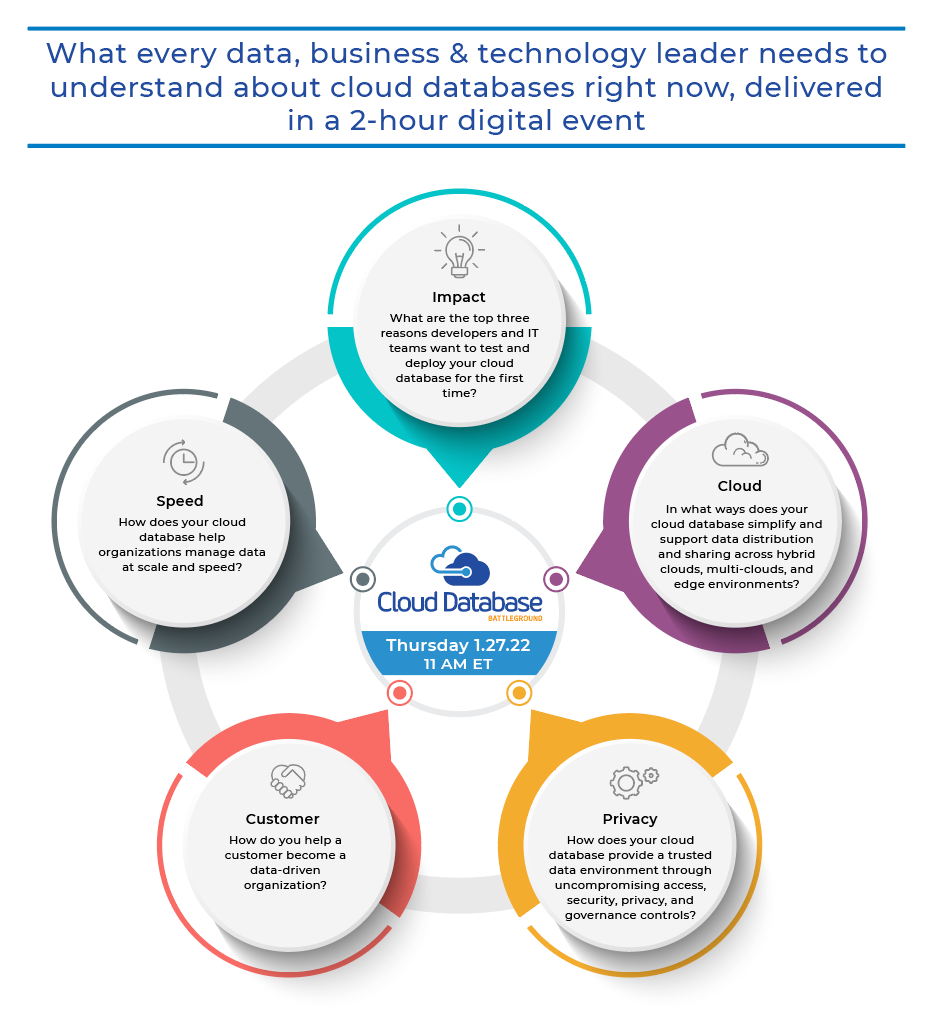
The cloud database market is growing quickly, on track to exceed $100 billion within a few years. The market is being driven by organizations migrating on-premises databases to the cloud and deploying new ones.
Which raises some timely questions for IT teams and business leaders: What capabilities are most important to development teams? How do cloud databases ensure a secure, trusted data environment? And in what ways can these new platforms be used to create new data-driven revenue opportunities?
Those are a few of the topics that leading cloud database providers will address during Acceleration Economy’s Cloud Database Battleground on January 27. Couchbase, Cockroach Labs, Redis, SingleStore, and Yugabyte will each offer their views on the latest innovations in cloud databases—and answer 5 vital questions that address strategy, speed, privacy, data sharing, and impact.
As part of this digital event, Acceleration Economy analysts got together to discuss and debate the opportunities for new approaches to data management, the challenges of breaking from legacy models and platforms, and the proactive strategies that business and technology decision makers must embrace if they are to go beyond incremental changes.
Here are 10 trends discussed in the Battleground roundtable
- To advance their data strategies, businesses must adopt a culture that treats data as “the world’s most valuable asset,” says Bob Evans, Founder of Cloud Wars and Co-Founder of Acceleration Economy. That leads to explorations such as: “How do you use data to make things better? To create new products and services? To differentiate and drive more value for your customers?”
- One of the keys to realizing greater value from terabytes and petabytes of data is to “find uses for data beyond what you originally thought,” says analyst Kenny Mullican, who is CIO with a mid-size manufacturing company. That happens when you put data into the hands of more people and departments, he says. Also, it may also be possible to monetize data assets as intellectual property.
- Best practices in data distribution and architecture are essential as organizations move data across hybrid, multi-cloud, and edge environments. “A world exists where we’re not dependent on a single cloud provider anymore,” says analyst Paul Swider, a heathcare technology expert. Cloud databases include capabilities such as replication and change data capture to facilitate data sharing and location-specific data residency.
- Despite the many advantages of hybrid and multi-cloud environments, data governance and security can become more complex, says Chris Hughes, a CISO and cybersecurity expert. It’s essential that technologists understand the controls available, such as encryption and key management, so they can be good stewards of customer data.
- Cloud databases are a natural complement to other technologies—including AI/ML, IoT, NLP, and storage—that organizations are using to build and expand their digital capabilities. They are also well-suited to a “generational shift” in user experience and newer data access methods such as verbal commands, says Aaron Back, Acceleration Economy Principal Analyst. “There’s a different set of expectations that people are bringing into the workplace.”
- One of the primary advantages of cloud databases is the ability ease some of the pressure on IT and dev teams. Managed cloud services and auto-scaling “serverless” technologies “alleviate administrative overhead of database administration and maintenance,” says Chris Hughes.
- Some cloud databases and data warehouses are optimized for analytics and have advantages over “decision support” tools of the past. These newer platforms simplify integration and data sharing, and they typically support a variety of end-user tools. Acceleration Economy analyst Wayne Sadin, an advisor to CXOs and Boards, calls analytics “the holy grail” of data management.
- Cloud databases can speed transactions, operations, and insights, all of which are critical in today’s acceleration economy. Performance comes in the form of sub-second response times, as well as through AI & ML for combing through mega data stores. “AI can help with that speed, if it’s used correctly,” says Aaron Back.
- Long-established database providers can’t rest on their laurels in the cloud database market, where emerging companies have the advantage of built-for-the-cloud product development. It only makes sense that incumbent database providers should use experience to their advantage. They must be able, says Wayne Sadin, “to take that knowledge and build a modern architecture.”
- CEOs should seek to drive data strategy in new ways. There are huge opportunities to engage business partners in the possibilities of data sharing and data-driven collaboration. Bob Evans advises business leaders to reach out their fastest-growing partners. “Have conversations with chief digital officers and chief data officers,” he says, and ask: “What are you doing with data? How can we work together?”
The 5 Battleground Questions

Those discussion points highlight a few of the major trends and issues to be discussed at the Cloud Database Battleground, and there will be more. We asked each of the presenting companies—Couchbase, Cockroach Labs, Redis, SingleStore, and Yugabyte—to answer five questions to help business and technology decision makers assess their position in all of these different areas.
The Cloud Database Battleground will take place on January 27 at 11 am ET. Registration is free at the Battleground website.






